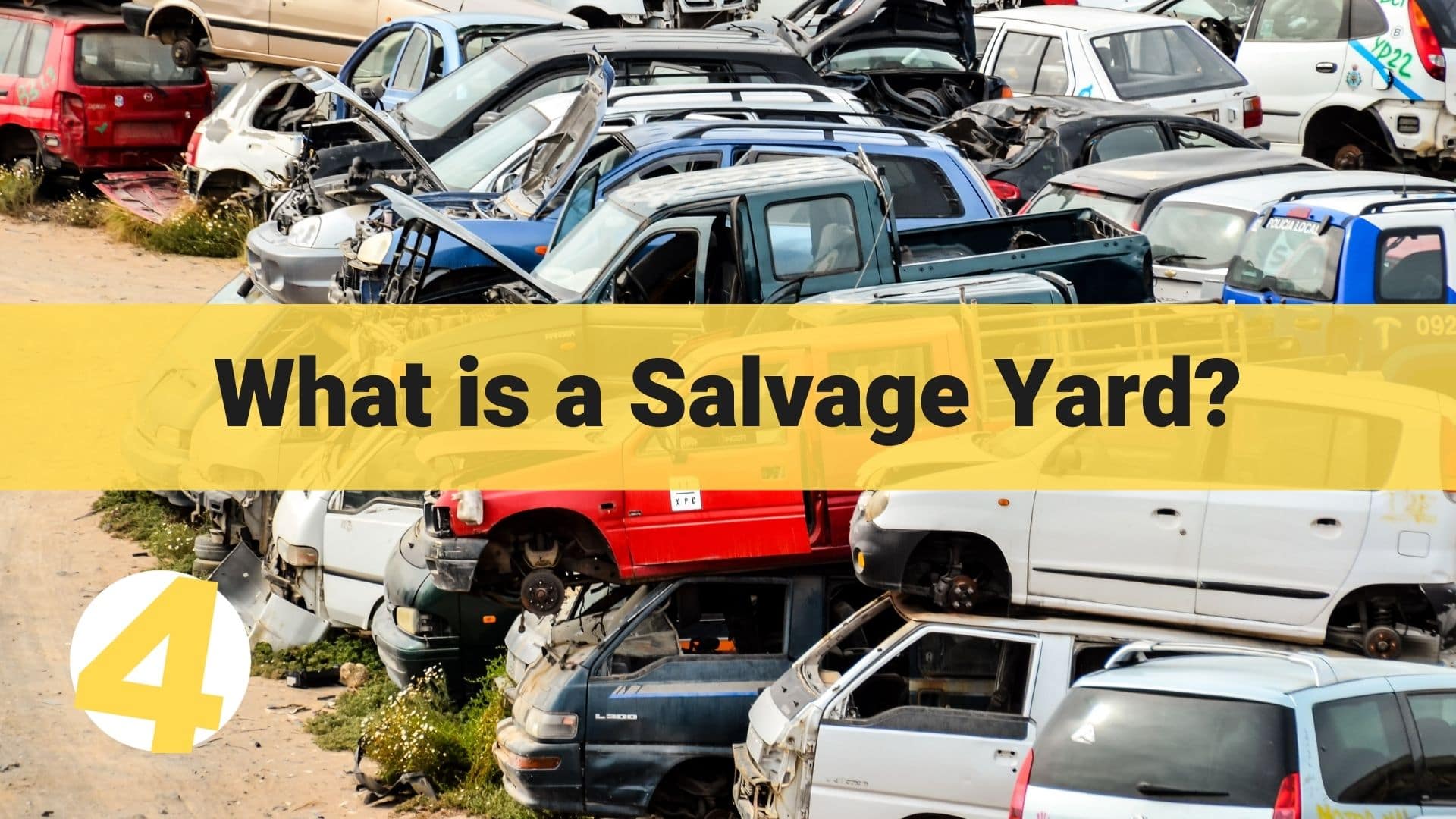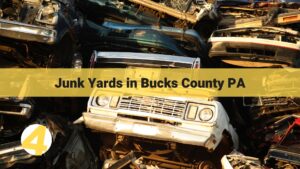A salvage yard, also called a junkyard or scrapyard, is a facility where discarded or wrecked vehicles and machinery are stored and disassembled for recycling or parts resale. These yards play a crucial role in the automotive and metal recycling industries.
You see, vehicles have a lifespan, and when they reach the end of it, they become more of a hassle than a help. They break down, rust, and take up valuable space in driveways and garages.
So, what’s the solution? Salvage yards come to the rescue. But don’t let the name fool you; these yards are more than just a parking spot. They breathe new life into old vehicles. But how? Let’s find out.
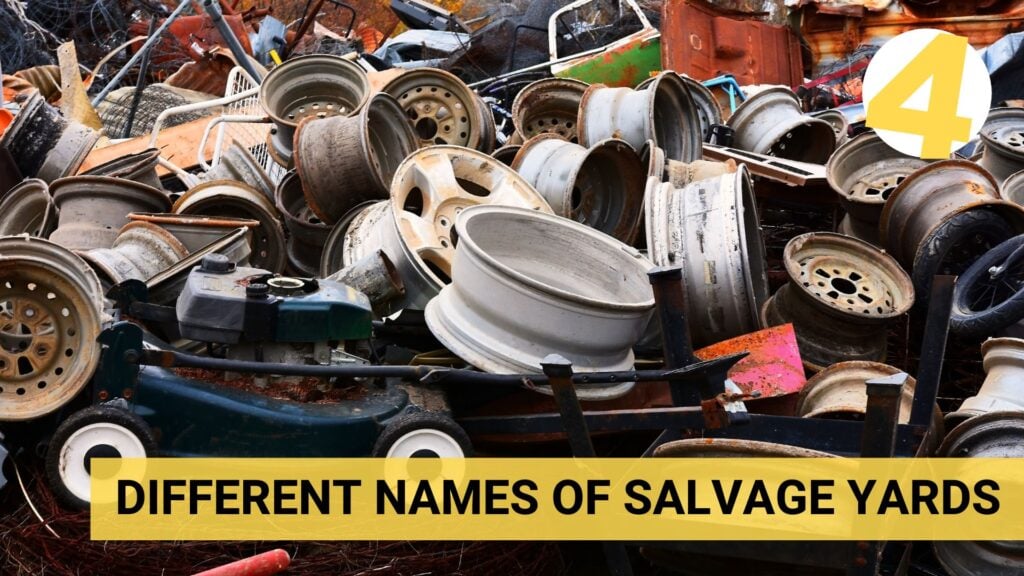
The Many Different Names of Salvage Yards
What is a salvage yard? A salvage yard is like a parking lot, but you won’t find any shiny, operational cars in it. Instead, it is filled with a motley crew of battered, bruised, and often unrecognizable vehicles. A salvage yard is essentially a resting place (but not final ⚰️) for old, damaged, or decommissioned vehicles.
If you’re looking for salvage yards, you must not be confused by the different terms they are called. Here are the most common ones:
| Other Names for Salvage Yards | Meanings |
| Auto Wrecking Yard | An auto wrecking yard is a specialized facility primarily focused on dismantling end-of-life vehicles to salvage reusable parts and materials. It specializes in automotive recycling and often follows environmental regulations for disposal. |
| Scrapyard | A scrapyard is a broader term that encompasses facilities where various discarded materials, not limited to vehicles, are collected for recycling or resale. While it may include automobiles, it also deals with other scrap metals, appliances, and industrial equipment. |
| Junkyard | A junkyard is an informal term often used interchangeably with a scrapyard or auto-wrecking yard. It refers to locations where various discarded items, such as vehicles and machinery, are stored, often with a connotation of neglect. |
| Breakers Yard | A breakers yard is another term for an auto-wrecking yard, particularly common in British English. It signifies a facility where vehicles are broken down and usable parts are extracted for resale or recycling. |
No matter what you call them, salvage yards ensure that even when a car reaches the end of its road, its components can continue to serve a purpose. This makes them a crucial industry in the automotive ecosystem.
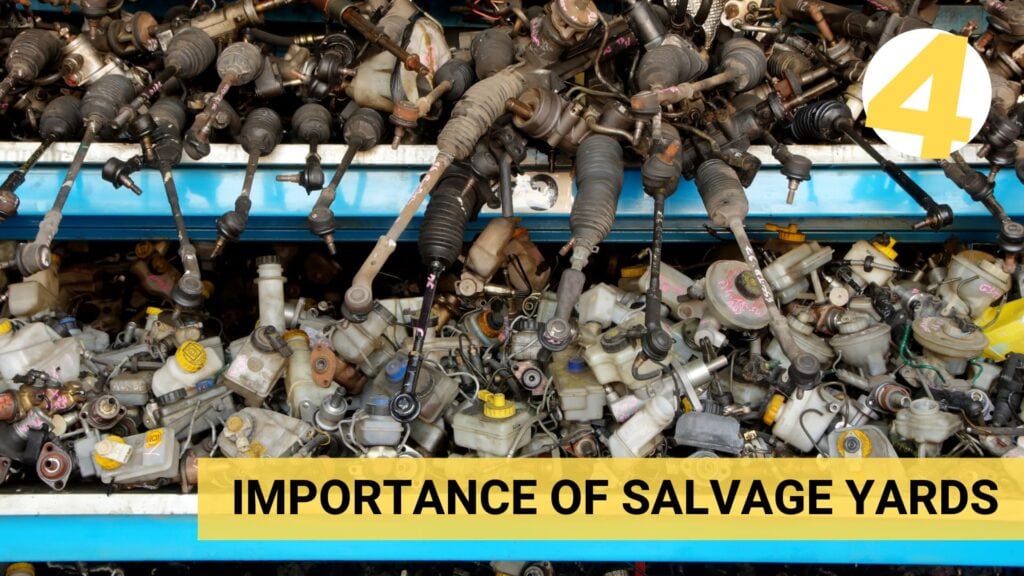
What Is the Importance of a Salvage Yard?
Now that you know the answer to – what is a salvage yard, it’s time to learn its importance. Salvage yards play several crucial roles, which include the following:
- Metal Recycling
Salvage yards are major players in recycling metals like steel and aluminum. By salvaging and recycling these materials, they help reduce the energy and resource-intensive process of mining and manufacturing new metals.
- Fluid Disposal
Salvage yards responsibly dispose of fluids such as oil, coolant, and brake fluid. These hazardous materials are carefully collected and processed to prevent environmental contamination.
- Tire Recycling
Old tires pose a significant environmental challenge. Salvage yards often work with recycling facilities to make sure tires are appropriately processed, which reduces the risk of illegal dumping and ecological harm.
- Repurposing Parts
Salvage yards are all about giving old parts a second life. By offering quality used components, they reduce the demand for new parts, which require raw materials and energy to produce.
- Educating the Public
Many salvage yards educate the public about recycling and the benefits of using recycled auto parts. They encourage sustainable practices and help raise awareness about the environmental impact of the automotive industry.
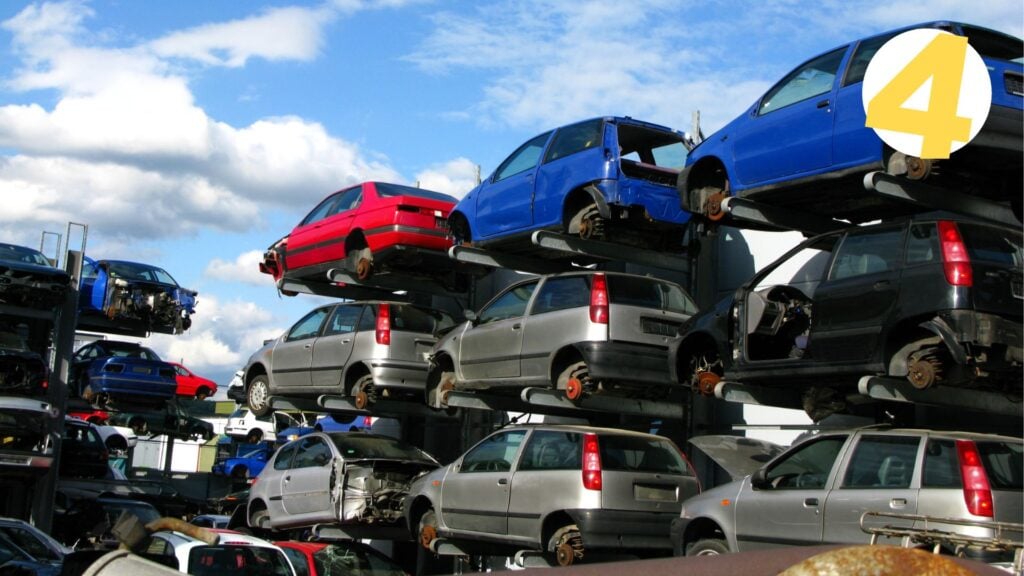
What To Expect When You Visit a Salvage Yard
Whether you are hopeful to see a vintage find or you are only curious about how it looks like, here are the commonly found vehicles you can expect to see:
- Cars. You’ll find cars of all makes, models, and ages, from compact sedans to luxury vehicles. Some may be relatively modern, while others could be vintage classics.
- Trucks. Salvage yards often feature a selection of pickup trucks, ranging from small utility trucks to heavy-duty workhorses.
- SUVs. These yards may have SUVs in various conditions and sizes.
- Motorcycles. Don’t be surprised if you stumble upon a collection of old motorcycles, which can be a fascinating find for bike enthusiasts.
- Vans.: Whether it’s a minivan or a cargo van, you’ll likely spot these practical vehicles in a salvage yard.
- Specialty Vehicles. Salvage yards sometimes harbor specialty vehicles like RVs, campers, and even boats.
Conditions of Vehicles in Salvage Yards
The conditions of vehicles in salvage yards can vary widely, and it’s all part of the charm:
- Junk Cars. Most items that fill the spaces in salvage yards are junk cars beyond economical repair. These vehicles may be missing components, have extensive rust, or have severe mechanical issues.
- Damaged Vehicles. Many vehicles in salvage yards have sustained collision damage. These cars can be a source of valuable parts, even if their overall structure is compromised.
- Totaled Vehicles. Salvage yards also house vehicles declared as total losses by insurance companies. While these cars may look fine on the outside, they often have hidden damage that makes repairing them uneconomical.
- Old Classics. Classic cars, though not necessarily in poor condition, can also be found in salvage yards. Enthusiasts often search these yards for restoration projects.
- Diverse Ages. You’ll find vehicles from various eras – from recent models to cars already considered automotive antiques.
Auto Parts and Components Found in Salvage Yards
If you are looking for components of different vehicle makes, these are some of the most common auto parts you’ll find in these yards:
- Engines and Transmissions. Salvage yards are goldmines for finding engines and transmissions in working condition.
- Body Panels. Need a replacement door, fender, or bumper? Salvage yards offer a selection of body panels in different states of repair.
- Interior Components. You can source parts in good condition, from seats to dashboard components, to update your vehicle’s interior.
- Electronics. Salvage yards often have a collection of electronics, including radios, navigation systems, and instrument clusters.
- Tires and Wheels. If your wheels need an upgrade or your tires are worn, you can often find good-quality replacements in salvage yards.
- Suspension and Steering. Components like shocks, struts, and steering columns are readily available for those looking to improve their vehicle’s handling.
- Brakes and Exhaust. Salvage yards have brake calipers, rotors, and exhaust systems, which you can use to save on repairs and upgrades.
- Specialty Parts. Vintage and rare parts are a hidden treasure in some salvage yards, perfect for classic car restoration or unique custom projects.
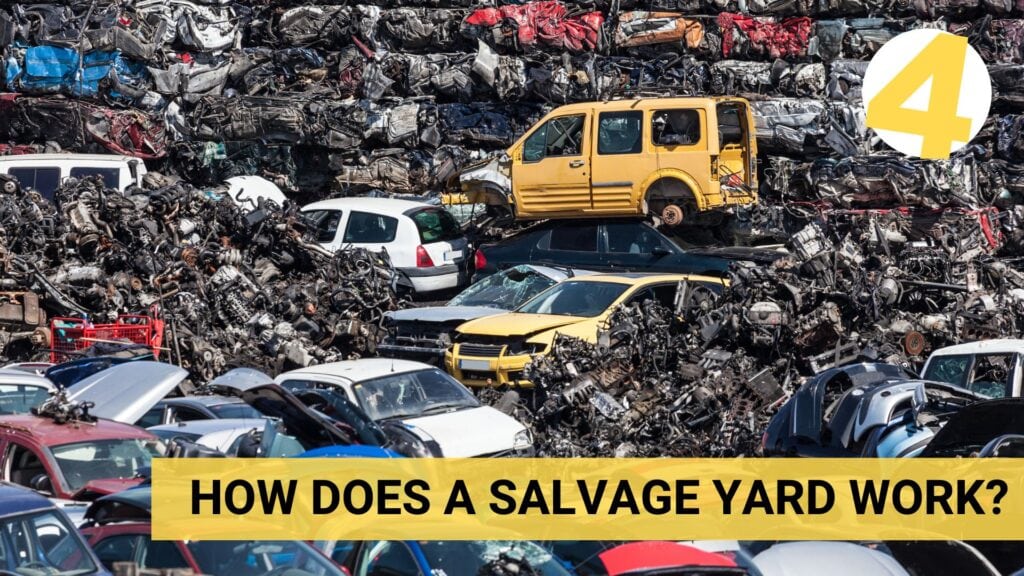
What Is a Salvage Yard and How Does It Work?
How do the vehicles end up in salvage yards? Here are the most common ways these damaged vehicles find their resting place:
- Accidents. Many vehicles in salvage yards have been involved in accidents. When a car sustains significant damage in a collision, it may be declared a total loss by insurance companies. Salvage yards often purchase these totaled vehicles.
- Mechanical Failures. Cars aren’t immortal; they break down, and sometimes the cost of repairing them exceeds their value. When owners face expensive repair bills, they might choose to sell their vehicles to salvage yards.
- Abandonment. Abandoned cars, left to rust in parking lots, streets, or private properties, sometimes find their way to salvage yards.
- End of Life. As vehicles age and accumulate wear and tear, they naturally reach the end of their life cycles. Owners looking to dispose of these cars may sell them to salvage yards.
- Insurance Write-Offs. Insurance companies sometimes declare cars as write-offs even if they aren’t involved in accidents. Cases of flooding, fire damage, or theft recovery can lead to vehicles ending up in salvage yards.
Steps Involved in Salvaging Vehicles
Here’s a look at how companies go about salvaging vehicles for parts or scrap:
- Vehicle Acquisition. Salvage yards acquire vehicles through various means, such as purchases from individuals, auctions, insurance companies, and towing services.
- Assessment. Once a vehicle arrives at the yard, mechanics and technicians evaluate its condition to determine which parts are salvageable and if the car can be resold without dismantling.
- Dismantling. The process begins if the decision is made to salvage the vehicle. Skilled workers carefully remove valuable components like engines, transmissions, electronics, and interior parts. These components are cleaned, inspected, and cataloged for future sale.
- Fluid Removal. Hazardous fluids such as oil, coolant, brake fluid, and transmission fluid are drained from the vehicle. These fluids are properly disposed of or recycled.
- Environmental Considerations. Salvage yards follow environmental regulations and best practices. They collect and store hazardous materials safely and often have containment systems to prevent soil or water contamination.
- Recycling. Once all salvageable parts are removed, the remaining vehicle shell is sent to a recycling facility. Here, it’s crushed and shredded to recover valuable metals like steel and aluminum.
- Part Sales. Salvage yards sell salvaged parts to a wide range of customers, from mechanics and repair shops to DIY enthusiasts. Many yards maintain online inventories to make it easier for customers to find and purchase specific parts.
Call Cash4Cars if You Don’t Have Time to Visit Salvage Yards
If you don’t know how, what, where, or who to get in touch with to bring your end-of-life vehicles to salvage yards or sell your junk car in Philadelphia, you can instead avail the services of Cash4Cars. Our business model provides an accessible and eco-conscious way for car owners to dispose of junk cars while reaping financial benefits.
Do you know what else makes Cash4Cars the right choice for helping you dispose of a damaged or cranky vehicle or get cash for junk cars? Our company makes everything easy. We have a team of professionals who will guide you on what to do to complete the process. We are only a call away, by the way.

